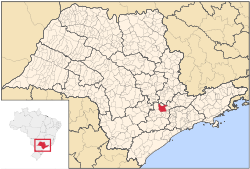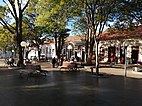Itu, São Paulo
Itu | |
|---|---|
| Municipality of Itu | |
 Location in São Paulo state | |
| Coordinates: 23°15′51″S 47°17′57″W / 23.26417°S 47.29917°W | |
| Country | |
| Region | Southeast |
| State | |
| Metrop. region | Sorocaba |
| Area | |
| • Total | 640.72 km2 (247.38 sq mi) |
| Elevation | 583 m (1,913 ft) |
| Population (2020[1]) | |
| • Total | 175,568 |
| • Density | 270/km2 (710/sq mi) |
| Time zone | UTC-03:00 (BRT) |
| • Summer (DST) | UTC-02:00 (BRST) |
| Postal code | 13300 |
| Area code | +55 11 |
| HDI (2010) | 0.773 – high[2] |
| Website | www |
Itu is a historic municipality in the state of São Paulo in Brazil. It is part of the Metropolitan Region of Sorocaba.[3] The population was 175,568 as of 2020, in an area of 640.72 km2.[4] The elevation is 583 m. This place name comes from the Tupi language, meaning big waterfall. Two rivers flow through Itu: Tietê and Jundiaí. Itu has five hospitals, eleven bank agencies and one shopping center, the Plaza Shopping Itu.
Itu was founded in 1610 by bandeirante Domingos Fernandes. It became a parish in 1653. In 1657, it was elevated to a town and municipality. It became a part of Brazil in 1822. It became a city in 1843.
Geography
[edit]Its climate is subtropical, temperatures varies from 16° and 22°. The summer is warm and dry, and the winters are moderately cold and dry.
It is located between the crystalline plateau and sedimentary areas.
Demographics
[edit]Population history
[edit]| Year | Population |
|---|---|
| 2001 | 135,366 |
| 2004 | 149,758 |
| 2009 | 157,384 |
| 2015 | 167,095 |
According to the 2000 IBGE Census, the population was 136,366, of which 123,942 are urban and 11,424 are rural. The average life expectancy was 71.53 years. The literacy rate was at 92.53%.
Transportation
[edit]The main roads passing through the municipality are:
Tourism
[edit]Itu was the birthplace of nationally-known comedian Simplicio, whose catchphrase was "back home in Itu everything is bigger". This led to the city becoming known as the "capital of large things", with a number of oversized objects being constructed there. The town's "exaggerations" include a 4m tall yellow pay phone called "orelhão", an oversized street light, a giant car tire (which was set on fire) and a mast decorated with a star, claimed to be the world's tallest artificial Christmas tree.[5]
With the increase in domestic tourism the infrastructure soon developed to attract foreign visitors as well as international meetings, seminars and congress events.[citation needed] In 1999 and 2003 the Seventh Day Adventist Reform Movement held their international delegation session in Itu bringing people from over 80 countries to the city at each event.[citation needed]
Media
[edit]In telecommunications, the city was served by Companhia Telefônica Brasileira until 1973, when it began to be served by Telecomunicações de São Paulo.[6] In July 1998, this company was acquired by Telefónica, which adopted the Vivo brand in 2012.[7]
The company is currently an operator of cell phones, fixed lines, internet (fiber optics/4G) and television (satellite and cable).[7]
Notable people
[edit]- Marcelo Chierighini, swimmer
- Ronaldo Mota Sardenberg (born 1940) is a Brazilian diplomat, at the United Nations (2003–2007), and politician[8]
Sister cities - twin towns
[edit]Itu is twinned with:
Images
[edit]-
Giant traffic signal. Itu is known as the capital of "large things"
-
Energy Museum
-
Giant public pay phone. Itu is known as the capital of "large things"
-
Itu celebrated its 400th birthday in 2010.
-
Igreja de Cristo (Church of Christ)
See also
[edit]References
[edit]- ^ IBGE 2020
- ^ "Archived copy" (PDF). United Nations Development Programme (UNDP). Archived from the original (PDF) on July 8, 2014. Retrieved August 1, 2013.
{{cite web}}: CS1 maint: archived copy as title (link) - ^ "Governo do Estado de São Paulo, Lei Complementar nº 1.241, de 8 de maio de 2014". Archived from the original on 18 October 2014. Retrieved 2015-09-29.
- ^ Instituto Brasileiro de Geografia e Estatística
- ^ "Small Town In Brazil Cultivates Big Image". The Washington Post. 3 December 2000.
- ^ "Creation of Telesp - April 12, 1973". www.imprensaoficial.com.br (in Portuguese). Retrieved 2024-05-27.
- ^ a b "Our History - Telefônica RI". Telefônica. Retrieved 2024-05-27.
- ^ Curriculum Vitae Archived 2006-04-23 at the Wayback Machine Brazilian Mission to the United Nations, Retrieved on 2009-06-29.
External links
[edit]- English translated Site
- (in Portuguese) Itu´s Portal
- (in Portuguese) Government Site
- (in Portuguese) Itu on citybrazil.com.br
















